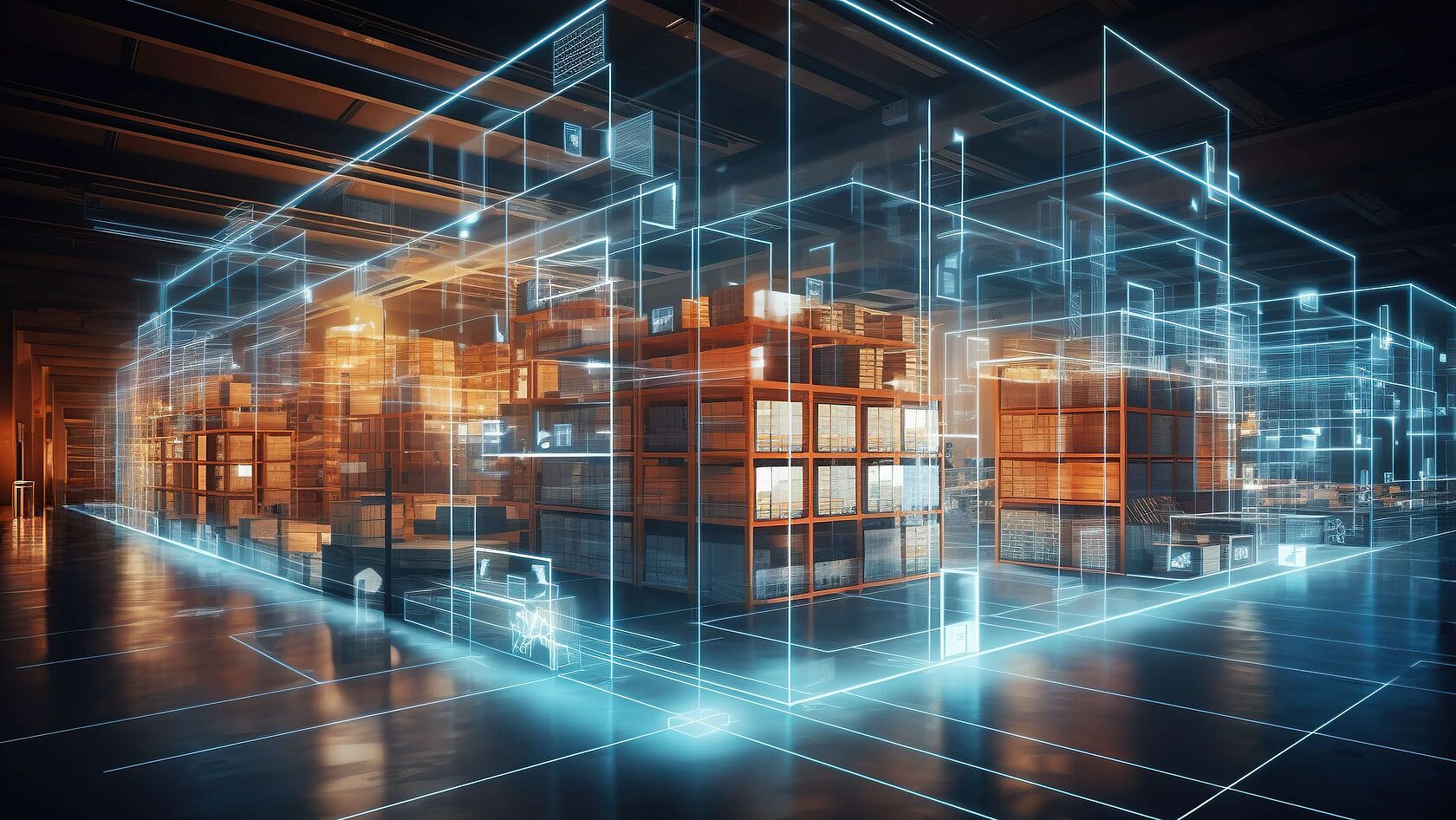
Artificial intelligence (AI) describes the imitation of human cognitive performance such as logical thinking, planning and making sensible decisions by machines. AI is a key pillar in the context of Industry 4.0 and is also becoming increasingly important in the logistics sector. According to a Bitkom study from 2023, around two thirds of the companies surveyed see artificial intelligence as the most significant technology of the future. Find out why it will be impossible to imagine the warehouse and supply chain without artificial intelligence in the future.
Challenges
Artificial intelligence is the most important development trend in the WMS market. This was the result of a survey conducted as part of the Fraunhofer IML's WMS Market Report 2022. Even today, many companies are recognizing the benefits of implementing artificial intelligence in their work processes.
Dynamic algorithms and large amounts of data
Machine learning, an AI discipline that uses dynamic algorithms and large amounts of data (big data), is particularly in demand. These algorithms enable the automated processing of data, which leads to a continuous learning process. Machine learning allows different data streams to be linked together. This allows patterns to be identified, which in turn can be used to predict future work processes and make optimal decisions as a result. With the help of intelligently evaluated data, productivity and efficiency increases can be achieved as future production and transport volumes can be predicted more accurately.
Customers want very short delivery times
In the age of e-commerce, one thing is particularly important for logistics companies: the fastest possible dispatch. In order to meet the requirements of end customers, who are used to very short delivery times, dynamic intralogistics is essential. Ideally, this involves designing strategies that can optimize internal workflows and significantly reduce travel times within the warehouse. AI can play a decisive role here.
KI zur Optimierung von Prozessen
AI can contribute to the optimization of processes, particularly in the application areas of procurement & purchasing, production and sales & distribution in warehouse management. Fraunhofer IML points this out in a whitepaper published in 2021. The institute cites movement analysis and the forecasting of transport arrival times in the warehouse as specific application examples. A closer look at warehouse logistics is particularly worthwhile here, as this area offers many starting points for optimized warehouse management, which can create an important competitive advantage. However, for many companies, the correct handling of the enormous amounts of data presents a challenge. Finding concrete approaches, recognizing potential or creating automated processes from the results can be overwhelming at first.
General Conditions
When using artificial intelligence in intralogistics, there are principles that should be observed when implementing it. Anyone who only imagines fully automated work processes and robots in an intelligent warehouse is only scratching the surface.
Usage Scenarios
How do companies succeed in developing value-adding processes from the abundance of data volumes? PSIwms AI from PSI gives the answer. This is a platform based on artificial intelligence that focuses on the analysis, planning and optimization of logistics processes. The platform performs thousands of analyses for warehouse operation scenarios every hour and offers optimization recommendations based on these. This enables, for example, the significant shortening of routes along the picking process, the simulation of the effects of new technologies on warehouse operations and the precise identification of bottlenecks in the warehouse.
Since 2020, PSI has been working on the further development of the AI platform in a multi-phase project with the help by the National Center for Research and Development (NCBR). In a pilot project, PSIwms AI was successfully implemented at LPP, owner of the fashion brands Reserved, Cropp, House, Mohito and Sinsay.
Conclusion
The demand for AI in logistics is growing steadily. According to a survey conducted by the ifo Institute in 2023, 13.3% of the companies surveyed use AI-based machines, 9.2% plan to use them and 36.7% are discussing possible areas of application. Digital technologies offer enormous potential, particularly in terms of efficiency and performance. A Bitkom study published in 2022 found that 84% of the logistics companies surveyed benefit in particular from time savings and 81% from better service for the end customer.
But what about the future of jobs in the age of Industry 4.0 and increasing automation? Will employees have to compete with AI for jobs? One thing is certain: work processes will also change in the warehouse. Repetitive tasks, for example in order picking, will be increasingly automated. However, humans cannot be completely eliminated from this process. AI is taking on the role of an assistant rather than a replacement. This is demonstrated by the example of PSIwms AI. This technology can be used to optimize picking routes, for example, which enables warehouse employees to work more efficiently and ergonomically. Artificial intelligence also creates new fields of activity, such as the maintenance of AI-supported robots. Thanks to AI solutions, companies can also expand their fields of activity and hire additional warehouse workers on site.
FAQs
How can artificial intelligence improve route optimization within the warehouse?
Artificial intelligence helps to determine the optimal transport routes for moving goods in the warehouse. As a result, products are transported more efficiently from one location to another, saving time and financial resources.
How does artificial intelligence support the prediction of delivery times and delays?
By analyzing traffic, weather conditions and past delivery times, AI enables a more accurate estimate of expected arrival times. This helps to improve supply chain transparency and reliability by providing customers with accurate information and enabling companies to respond better to unforeseen events.
How can companies use artificial intelligence to improve quality assurance in the supply chain?
Along the supply chain, AI recognizes patterns and deviations in production processes, automates quality checks and thus increases the accuracy and efficiency of quality assurance. With the help of machine learning and data analysis, AI supports companies in ensuring high-quality products and identifying potential quality problems at an early stage.

